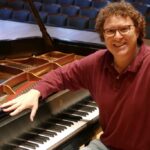
by Ashley Lucas
As the Coronavirus pandemic has surged on around us, staff within the music department have had to rethink the ways in which the department operates. Over the course of the semester, I had the chance to talk to the staff of the music department about how the COVID-19 Pandemic has impacted the department as well as each of their individual responsibilities. Here is what they said!

One major part in rethinking the way the department operates was communication both between the staff, as well as communication with students. The music department chair, David Garcia, cited Cat Zachary, Communications Coordinator, as being instrumental in keeping communication open. Cat said that because her job lives in the virtual world already, there has been quite a bit of continuity for her despite the shift to remote learning and working during the COVID pandemic. However, it has come with its own challenges. She said, “The main difference is the added communications to the various constituencies of our department about plans, schedules, health and safety guidelines, and opportunities. It’s been a challenge to find ways to effectively communicate to everyone when we’re all so waterlogged with digital information, but in a good way. Finding these new ways, such as creating more wide-reaching listservs and being more mindful in targeting specific groups via different social media platforms, is something that I know I’ll continue to do after the pandemic is over.” Cat believes that for her, finding effective ways to communicate with students, faculty, and staff has been the biggest challenge. However, out of these challenges has come great success. Cat said, “I think one of the biggest wins here is the creation of the new music student listserv that captures the most non-majors we’ve ever been able to before. In the past we’ve operated under an “opt-in” listserv model, but since COVID, we’ve discovered that it was important to put all the emails of students registered in music classes into a listserv – in an “opt-out” model instead. I hope (and believe) this has been good for students to feel more included and connected to the department and our wide variety of offerings.”

David Garcia, department chair, raved about how crucial the staff have been during his transition to department chair. “The staff have been fundamental in keeping the department operational. We can teach our courses remote, but not all of the department’s work can be done remote.” He specifically mentioned Jay Harper and Jesse Moorefield, who engineered a system that enables safe performance of music – a vital resource for ensembles and chamber/combo groups that come back to the department in the spring. When asked how COVID challenged his transition to department chair, he says that it has inspired him more than it has challenged him.
“My transition to department chair has not been challenged by COVID as much as it has inspired me to foster stronger ties with staff, faculty, and students. We are all experiencing new needs in order to do our work, and I feel it is a great responsibility–one I welcome–to do what I can to facilitate my colleagues’ work now and for the near future.”
He also stressed the importance of making sure that students feel supported despite the uncertainties coming from COVID. “I have tried to keep communication channels open with graduate and undergraduate students. I have enjoyed the few opportunities I’ve had to meet with music majors, for instance, via Zoom. I understand that students are under immense pressure–more than what is typical during normal semesters–and so I also try to respect their space and time. But I hope they know that they can reach out to me at any time for any reason either by email or cell. One of my most important duties as chair is to help support not only their education but also their well-being.”

The department Production Manager, Jesse Moorefield, outlined how his responsibilities has shifted while working during the pandemic. “During a normal year I would have been the production manager for over 120 live events. During this time, I have shifted my focus to providing technology and support for our students and faculty to perform and rehearsal remotely.” He has helped implement an audio and video system in Hill Hall and Kenan Music Building that allows musicians to play together from separate locations. This same technology allowed the department the live-stream a concert this semester, and he hopes to be able to continue this into the spring. In addition, he has added on the task of helping faculty and their students with virtual video performances. Students record their parts at home, and Jesse mixes the audio and video together into one group performance. All in all, he said, “In some ways it’s been really different and, in some ways, the same. Helping our musicians present their work to an audience. It’s just the platform may be different.” He has also made sure that students are feeling supported by him during this uncertain time by helping with the use of recording facilities to record grad school auditions, juries, and competition auditions. In addition to supporting the students, Jesse says that the staff has also made sure to be supporting each other during this time.
“We have been meeting once a week over Zoom and checking in on each other. These meetings mean a lot to us and have been a big help. Sometimes we are planning for next semester, sharing favorite recipes, or celebrating a birthday. Mainly just being there for each other. When times are really busy, we all jump in and help each other even if the job task is not exactly what we did in the past. We really work well together.”

Jay Harper, the department’s Multimedia Technician, says that he is enjoying his current responsibilities despite the shift that COVID has brought on. “I enjoy solving problems and providing my colleagues and our students with the solutions they need to be safe and make music. I hope I get to retain some of these responsibilities once the pandemic is over.” On top of being the Multimedia Technician, he is also the facilities manager for the department. While his role as facilities manager has been largely unchanged, his role has shifted much more towards a media production role, as well as networking and IT. One major challenge that Jay mentioned was overcoming a way to safely make music. He and Jesse Moorefield collaborated on the system that allows for musicians to be able to play together from separate rooms with low-latency audio and video. He says this system is flexible and that it has been critical to the functioning of the department during the pandemic. In addition to that, he has taken on the responsibility of providing access, equipment, and CPE for the approximately 50 students who require a physical space on campus for lessons and practice each week.

One person that misses the in-person contact she often had with students due to her job, is department registrar Angeline Warren. When asked how it has been to not have many students around, she said that she misses being in Hill Hall and helping the students in person. While she is still in contact with many students virtually, it is nothing like the in-person contact she is used to. She also shouted out the music staff for their working together in order to do whatever is needed to prepare students and faculty for operating during the pandemic.

Max Mitler, Piano Technician, is used to being emersed in the noise of the music department. The relative silence that the pandemic has brought on has been something that he had had to adjust to. He said, “Honestly, it’s too quiet around here. Music departments are usually full of life and sounds. My workshop is in the practice room area and typically it’s quite noisy down here, you can hear some pretty amazing stuff a lot of the time and that’s something I have grown accustomed to. Working in an almost silent music department is a little off-putting and has taken some getting used to.” He goes on to talk about how during the normal school year, his days are pretty engaging, constantly running around tuning, checking pianos, and doing shop work. However, now his days are sort of flat. The pandemic has caused his responsibilities to shift, leaving him to refocus his work to mostly maintenance issues. While tuning falls into this and is something that he is keeping up with for the few students who are still using practice facilities, it is now much more preventative maintenance and refurbishing projects that keep him busy.

Someone else who has struggled with the relative silence of the COVID music department is David Michaud, who works with the University Band.
“The biggest change has to be how quiet Hill Hall has become. My office is right above the practice rooms, so I’m used to hearing music seep up through the floor from soloists and ensembles alike. With so few students on campus utilizing the practice rooms, I don’t have the privilege of hearing as many musicians these days. I am thankful to be able to interact with a few of our work-study students on a weekly basis. I love to hear their perspectives on all that is happening on and around campus.”
Along with this change of noise, his responsibilities are also shifting. David says that he is used to managing the logistical aspects of a 200 plus piece marching band this time of year and, because of COVID, does not have these responsibilities at this time. He notes that something positive has come out of this shift with the amped-up alumni communications that will have long-term benefits for the program.

After talking with El Fisseha, the music department’s Business Manager, it was evident how well the music department staff has worked together to be sure that everyone felt supported during the transitions and changes that the COVID-19 pandemic produced. She talked about the support between staff members, making sure they are feeling supported both professionally and personally as the pandemic surged on around them. One talking point was about the weekly virtual staff meetings the department staff participated in, and how they provided not just a space to talk about business, but also a place to see each other and chat about what was going on. She raved about her fellow staff and their work over the summer and the beginning of the fall semester. She shouted out Jay Harper for his taking over the role of CPE Coordinator and Angeline Warren for working with students and professors as they shifted from on campus to in-person instruction. She also talked about the incredible things that Jay Harper and Jesse Moorefield accomplished with the new tech that allowed the department to keep operating in a new way. These are just a few of the many staff members that El mentioned, however, and she did go on to speak highly about so many and the work that they are doing. One aspect of El’s job as the business manager is to make sure that all purchases through the department are entered in and labeled according to what the purchase was for. She mentioned that one way in which this responsibility was amped up came from the scrutiny of making sure that every purchase and order that had to do with COVID was marked and flagged so that the university could tell it apart from a purchase that would be made during a normal semester.
Collaboration, communication, and support are just a few of the many words that come to mind when thinking about how the staff has kept the department putting out beautiful sounds in a rather ugly time. Even with all the challenges that the pandemic has produced, the staff have made sure that the department has not been and will not be silenced.
